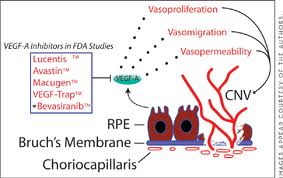Age-related macular degeneration in the past meant blindness for the patient. In more recent years laser surgery could be a sight saver, but it also meant a more invasive treatment.
The arrival of new anti-angiogenic drugs that can reverse age-related macular degeneration has received a lot of attention at the recent Schepens International Society ophthalmology meeting. The new drugs Macugen (pegaptanib sodium injection) and Lucentis (ranibizumab) were showing that they stopped the disease in 95% of cases. They were injected into the vitreous of the eye, and the vision of those patients who took it, actually improved.
Macugen has been approved by Health Canada and will be launched for use in September 2005, according to Pfizer, the company behind the drug therapy.
The research goes back to the 1970’s with the discovery of a process that forms new blood vessels in the body allowing tumors to thrive and metastasize. This research revolutionized the understanding of cancer. The new anti-angiogenic drugs fight a protein that induces angiotensin and is responsible for the abnormal blood vessel growth under the retina. This blood vessel growth causes macular degeneration (the wet form).
Dr. Judah Folkman, a Harvard professor of cell biology, gave the presentation and he stated that this new approach would be “a lot of hope to patients.”
More information about macular degeneration: http://nethealthbook.com/eye-diseases-and-eye-related-topics/retinal-problems/macular-degeneration/
Reference: The Medical Post, July 5, 2005, page1, 58
Last edited October 29, 2014






